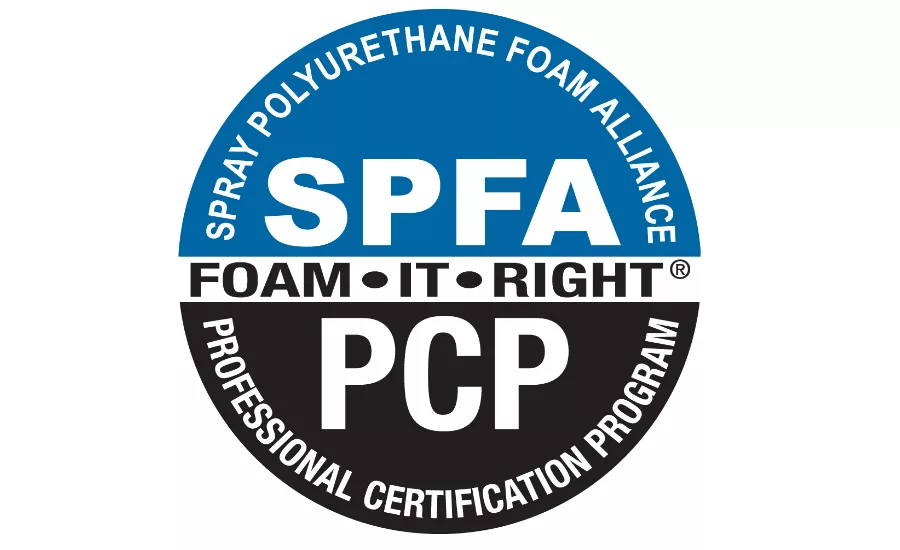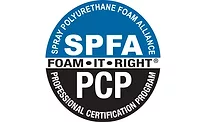Spray Polyurethane Foam Alliance Announces Growth of Industry’s Professional Certification Program (PCP)

FAIRFAX, Va. – The Spray Polyurethane Foam Alliance (SPFA), the educational and technical voice of the spray polyurethane foam (SPF) industry, released statistics for its industry-leading Professional Certification Program (PCP) with numbers indicating growing participation and certification completions across the country. A program designed to help ensure best practices in the handling and installation of spray polyurethane foam, the SPFA’s certification program metrics showcase the growing adoption and support of the program among key industry constituents including those involved with installation, as well as among contractor and supplier companies serving both the roofing and insulation sectors.
The SPFA reports a total of 1,467 certifications issued and 1,001 individuals registered in the program. 2,716 written exams and 235 field exams have been administered. Participants in the program now span 45 of the 50 U.S. states. Examination prep courses and exams have been offered in 28 different states and administered by nearly 35 industry-leading companies within the spray polyurethane foam sector. These numbers cover the timespan from the program’s inception in March 2013 through the end of February 2017.
“We are very pleased with the steady climb in program registrants, tests completed and certifications obtained through the SPFA Professional Certification Program,” said Kelly Marcavage, director of certification for the SPFA. “This growth spotlights our industry’s proven desire to ensure the highest possible performance of spray polyurethane foam in insulation, roofing and specialty applications, as well as to ensure safety.”
The SPFA Professional Certification Program is an internationally recognized, only-one-of-its-kind program built for those involved in the installation of spray polyurethane foam. Covering both roofing and insulation applications, the program advocates industry best practices and safety in the installation of the highly effective and energy-efficiency enhancing product. The standards-driven program is ISO 17024 compliant and was developed by committees of industry stakeholders in collaboration with OSHA, NIOSH, and EPA, in addition to other federal agencies and external stakeholders. It is offered both domestically and internationally.
The PCP offers certification opportunities at various levels to accommodate and serve all industry participants involved in the installation of the product. Certification testing levels include those for Assistant, Installer, Master Installer, Project Manager and Field Examiner, and separate tracks are established to accommodate both roofing and insulation professionals. Additionally, company-wide accreditation opportunities are available through the program in the Contractor Company and Supplier Company categories. There is also a Supplier Representative certification that may be obtained for individual supplier and manufacturing professionals looking to demonstrate their understanding, experience and commitment to the industry in ways that relate directly to their contractor customers.
The PCP is available online offering 24/7 access and test administration. Written tests for the first three certification levels – Assistant, Installer, and Master Installer – are offered in English and Spanish, both on-paper and online, allowing for remote testing. The SPFA plans to offer additional level tests in Spanish, in addition to the currently provided English language tests, in the future. SPFA also provides exam preparatory materials to PCP candidates in the form of written Study Guides, and offers Assistant-level exam prep via accessible webinars in both English and Spanish. SPFA is working to move additional preparatory materials online in 2017.
“We are consistently working to create process enhancements to the Professional Certification Program to better the testing experience from start to finish for all participants,” said Bonnie Strickler, chair of the SPFA Professional Certification Program. “While the standards of knowledge required to pass the various certification levels and categories will remain the same, these refinements streamline the testing process and strengthen the program even further.”
To become certified in the PCP, participants must pass the exam(s) and meet the criteria for the level and category of certification desired. The program is progressive, with each level obtained only after the candidate passes the written exam for the level they are seeking, all previous levels, and subsequently completes the requirements for the current level. All certified participants and organizations receive professional credentials including certificates and wallet cards to demonstrate their program completion and industry expertise.
“The success of the SPFA Professional Certification Program underscores the industry’s focus on prioritizing best practices and safety within the spray foam sector,” said Kurt Riesenberg, executive director of the SPFA. “Because of the growth in the program, we have also begun to see a climb in customers asking for proof of certification among the professionals they are considering for projects. Those who are not currently certified will soon come to realize they are missing a significant, affordable and accessible opportunity for business growth, customer confidence and industry recognition that will become the normal expectation among customers.”
For more information, visit sprayfoam.org/certification.
Looking for a reprint of this article?
From high-res PDFs to custom plaques, order your copy today!





